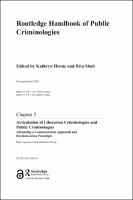Chapter 5 Articulation of Liberation Criminologies and Public Criminologies
Proposal review
| dc.contributor.author | Agozino, Biko | |
| dc.contributor.author | Agozino Ducey, Kimberley | |
| dc.date.accessioned | 2020-08-20T13:58:52Z | |
| dc.date.available | 2020-08-20T13:58:52Z | |
| dc.date.issued | 2020 | |
| dc.identifier.uri | https://library.oapen.org/handle/20.500.12657/41393 | |
| dc.description.abstract | Featuring contributions from scholars from across the globe, Routledge Handbook of Public Criminologies is a comprehensive resource that addresses the challenges related to public conversations around crime and policy. In an era of fake news, misguided rhetoric about immigrants and refugees, and efforts to toughen criminal laws, criminologists seeking to engage publicly around crime and policy arguably face an uphill battle. This handbook outlines the foundations of and developments in public criminology, underscoring the need to not only understand earlier ideas and debates, but also how scholars pursue public-facing work through various approaches. The first of its kind, this collection captures diverse and critical perspectives on the practices and challenges of actually doing public criminology. The book presents real-world examples that help readers better understand the nature of public criminological work, as well as the structural and institutional barriers and enablers of engaging wider audiences. Contributors address policies around crime and crime control, media landscapes, and changing political dynamics. In examining attempts to bridge the gaps between scholarship, activism, and outreach, the essays featured here capture important tensions related to inequality and social difference, including the ways in which criminology can be complicit in perpetuating inequitable practices and structures, and how public criminology aims—but sometimes fails—to address them. The depth and breadth of material in the book will appeal to a wide range of academics, students, and practitioners. It is an important resource for early career researchers, more established scholars, and professionals, with accessible content that can also be used in upper-level undergraduate classes. | |
| dc.language | English | |
| dc.subject.other | Political climate | |
| dc.subject.other | Public criminologies | |
| dc.subject.other | Public criminology | |
| dc.subject.other | Public engagement | |
| dc.subject.other | Translating research | |
| dc.subject.other | activism | |
| dc.subject.other | civic missions | |
| dc.subject.other | political dynamics | |
| dc.subject.other | post-colonial realities | |
| dc.subject.other | public criminology | |
| dc.title | Chapter 5 Articulation of Liberation Criminologies and Public Criminologies | |
| dc.type | chapter | |
| oapen.identifier.doi | 10.4324/9781351066105 | |
| oapen.relation.isPublishedBy | 7b3c7b10-5b1e-40b3-860e-c6dd5197f0bb | |
| oapen.relation.isPartOfBook | 3405f6a9-8a73-4008-8fc1-20fa4505409a | |
| oapen.relation.isbn | 9781138479296 | |
| peerreview.anonymity | Single-anonymised | |
| peerreview.id | bc80075c-96cc-4740-a9f3-a234bc2598f1 | |
| peerreview.open.review | No | |
| peerreview.publish.responsibility | Publisher | |
| peerreview.review.stage | Pre-publication | |
| peerreview.review.type | Proposal | |
| peerreview.reviewer.type | Internal editor | |
| peerreview.reviewer.type | External peer reviewer | |
| peerreview.title | Proposal review | |
| oapen.review.comments | Taylor & Francis open access titles are reviewed as a minimum at proposal stage by at least two external peer reviewers and an internal editor (additional reviews may be sought and additional content reviewed as required). |

